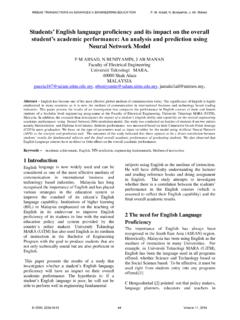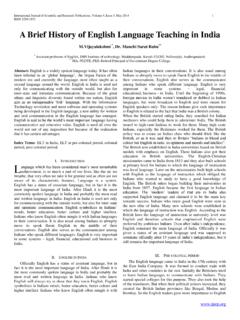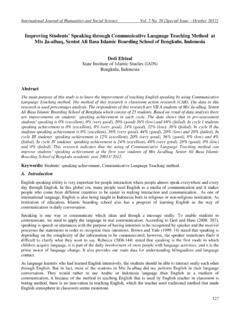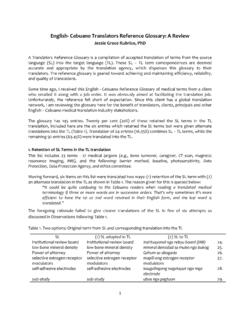Transcription of Good Practice Principles for English language proficiency ...
1 DOCUMENT 1 good Practice Principles for English language proficiency for international students in Australian universities Introduction The project The Department of Education, Employment and Workplace Relations (DEEWR) has funded a project to develop a set of good Practice Principles for English language proficiency in academic studies. This project's focus is international students studying in universities in Australia. However the Principles can be applied more generally to learning and teaching of all higher education students and they can be used by other post secondary educational institutions. The project has been undertaken by a Steering Committee convened by the Australian Universities Quality Agency (AUQA).
2 A list of Steering Committee members is given on the last page of this document. The project is a quality enhancement activity for the Australian university sector and reflects extensive work being undertaken in many Australian universities. It builds on the outcomes of a 2007 National Symposium commissioned by the Department of Education, Science and Training. (The outcomes from this Symposium, and the evidence based background papers that informed discussions at the Symposium, are available from the Australian Education International website at ) Definition of English language proficiency For this project, English language proficiency ' has been defined as the ability of students to use the English language to make and communicate meaning in spoken and written contexts while completing their university studies.
3 Such uses may range from a simple task such as discussing work with fellow students, to complex tasks such as writing an academic paper or delivering a speech to a professional audience. This view of proficiency as the ability to organise language to carry out a variety of communication tasks distinguishes the use of English language proficiency ' from a narrow focus on language as a formal system concerned only with correct use of grammar and sentence structure. The project Steering Committee recognises that in many contexts the terms English language proficiency ' and English language competence' are used interchangeably. Context English language proficiency has become an important issue in Australian higher education due in part to a heightened awareness of the role of English language ability in employment outcomes and the role of international graduates in meeting skill shortages in the Australian workforce.
4 There is also an increased recognition within universities of the fundamental nature of language in learning and academic achievement for all students. The rapid progress of global higher education is prompting universities in other countries to address the complex issues of learning and teaching in multilingual environments. Given the current prevalence of English in work and professional fields internationally, many universities are seeking better ways for students whose first language is not English to develop their disciplinary English language proficiency through academic studies. 1 DOCUMENT 1 For the retention and academic success of international students in Australian universities, a range of skills and strategies (in particular, written and oral communication) need to be made visible, explicit, and accessible and, importantly, integrated within specific disciplinary contexts.
5 The good Practice Principles are one way to demonstrate the commitment and leadership of Australian universities in the area of English language proficiency for international students with English as an additional language . While attending to university entry requirements, the Steering Committee has emphasised the development of English language proficiency throughout students' studies. In doing so, the Steering Committee has been guided by a number of key ideas, as follows: With widening participation across tertiary education and the increasing numbers of international students, it can no longer be assumed that students enter their university study with the level of academic language proficiency required to participate effectively in their studies.
6 Irrespective of the English language entry requirements of the university, most students, in particular those from language backgrounds other than English , will require English language development throughout the course of their studies. Different disciplines have different discourses of academic inquiry. Students' English language proficiency can be developed through appropriate course design, supplemented where necessary by other developmental activity. Development of academic language and learning is more likely to occur when it is linked to need ( academic activities, assessment tasks). English language proficiency is one part of the wider graduate attribute agenda since English language communication skills are crucial for graduate employment.
7 How will the good Practice Principles be used? The good Practice Principles have been developed in consultation with Australian universities and other stakeholders. They aim to describe what is known about current good Practice , taking into account the diversity of Australian universities. The Principles are general statements for individual universities to address in the context of their own operations and environment. As one university stated in its response to the consultation draft: Because the missions, pedagogical approaches, and student populations at and within each university are increasingly diverse, the Principles must be broad enough to allow for institutions to respond in ways appropriate to their particular situation'.
8 The expectation of the project Steering Committee is that universities will consider the Principles as they would consider other guidelines on good Practice . As part of AUQA quality audits universities can expect to be asked about the way they have addressed the Principles , just as they are likely to be asked by AUQA auditors about their application of a range of other external reference documents for the university sector. The examples of good practices given in the thematic guide are examples only and not intended to be prescriptive. They are provided to assist universities and other institutions in reviewing and improving their own activities. 2 DOCUMENT 1 good Practice Principles 1. Universities are responsible for ensuring that their students are sufficiently competent in the English language to participate effectively in their university 2.
9 Resourcing for English language development is adequate to meet students' needs throughout their studies. 3. Students have responsibilities for further developing their English language proficiency during their study at university and are advised of these responsibilities prior to enrolment. 4. Universities ensure that the English language entry pathways they approve for the admission of students enable these students to participate effectively in their studies. 5. English language proficiency and communication skills are important graduate attributes for all students. 6. Development of English language proficiency is integrated with curriculum design, assessment practices and course delivery through a variety of methods.
10 7. Students' English language development needs are diagnosed early in their studies and addressed, with ongoing opportunities for self assessment. 8. International students are supported from the outset to adapt to their academic, sociocultural and linguistic environments. 9. International students are encouraged and supported to enhance their English language development through effective social interaction on and off campus. 10. Universities use evidence from a variety of sources to monitor and improve their English language development activities. 1. For international students studying in Australia, it is a requirement of the National Code's standard 2 under the Education Services for Overseas Students Act 2000 that registered providers ensure students' qualifications, experience and English language proficiency are appropriate for the course for which enrolment is sought'.








